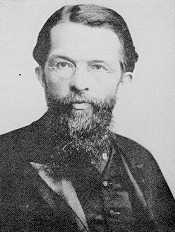- Carl Menger
:"This article is about the economist, not about his son, the mathematician
Karl Menger ."Infobox_Economist
school_tradition =Austrian School
color = #B0C4DE

image_caption = Carl Menger, founder of the Austrian School
name = Carl Menger
birth = birth date|1840|2|28
death = Death date and age|1921|2|26|1840|2|28
nationality = Austrian
field =
influences =
opposed =
influenced =Eugen von Böhm-Bawerk Friedrich von Wieser
contributions =Marginal utility Carl Menger (
February 28 ,1840 –February 26 ,1921 ) was the founder of theAustrian School ofeconomics , famous for contributing to the development of the theory ofmarginal utility that refuted thelabor theory of value developed by the classical economistsAdam Smith andDavid Ricardo .Menger was born in
Nowy Sącz ,Poland (at that timeNeu Sandec , Austrian Galicia). He was the son of a wealthy family of minor nobility; his father, Anton, was a lawyer. His mother, Caroline, was the daughter of a wealthy Bohemian merchant. He had two brothers, Anton and Max, both prominent as lawyers. After attending "Gymnasium" he studied law at the Universities of Prague and Vienna and later received a doctorate in jurisprudence from theJagiellonian University inKraków . In the 1860s Menger left school and enjoyed a stint as a journalist reporting and analyzing market news, first at the "Lemberger Zeitung" inLwów ,Ukraine and later at the "Wiener Zeitung" inVienna .During the course of his newspaper work he noticed a discrepancy between what the
classical economics he was taught in school said about price determination and what real world market participants believed. In 1867 Menger began a study ofpolitical economy which culminated in 1871 with the publication of his "Principles of Economics " "(Grundsätze der Volkswirtschaftslehre)," thus becoming the father of theAustrian School of economic thought. It was in this work that he challenged the classical labor theory of value with his theory of marginality.In 1872 Menger was enrolled into the law faculty at the
University of Vienna and spent the next several years teaching finance and political economy both in seminars and lectures to a growing number of students. In 1873 he received the university's chair of economic theory at the very young age of 33.In 1876 Menger began tutoring Archduke Rudolf von Habsburg, the Crown Prince of
Austria in political economy and statistics. For two years Menger accompanied the prince in his travels, first through continental Europe and then later through the British Isles. He is also thought to have assisted the crown prince in the composition of a pamphlet, published anonymously in 1878, which was highly critical of the higher Austrian aristocracy. His association with the prince would last until Rudolf's suicide in 1889 (see the Mayerling Affair).In 1878 Rudolf's father, Emperor Franz Josef, appointed Menger to the chair of political economy at
Vienna . The title of "Hofrat" was conferred on him and was appointed to the Austrian "Herrenhaus" in 1900.Ensconced in his professorship he set about refining and defending the positions he took and methods he utilized in "Principles," the result of which was the 1883 publication of "Investigations into the Method of the Social Sciences with Special Reference to Economics (Untersuchungen über die Methode der Socialwissenschaften und der politischen Oekonomie insbesondere)." The book caused a firestorm of debate, during which members of the
Historical School of economics began to derisively call Menger and his students the "Austrian School " to emphasize their departure from mainstream economic thought inGermany . In 1884 Menger responded with the pamphlet "The Errors of Historicism in German Economics" and launched the infamous "Methodenstreit ," or methodological debate, between the Historical School and theAustrian School . During this time Menger began to attract like-minded disciples who would go on to make their own mark on the field ofeconomics , most notablyEugen von Böhm-Bawerk andFriedrich von Wieser .In the late 1880s Menger was appointed to head a commission to reform the
Austria n monetary system. Over the course of the next decade he authored a plethora of articles which would revolutionizemonetary theory including "The Theory of Capital" (1888) and "Money" (1892). Largely due to his pessimism about the state of German scholarship Menger resigned his professorship in 1903 to concentrate on study.See also
*
Liberalism in Austria External links
* [http://www.mises.org/content/mengerbio.asp Biography of Carl Menger] The Founder of the Austrian School by Joseph T. Salerno
* [http://www.econlib.org/library/Enc/bios/Menger.html Biography of Carl Menger] The Concise Encyclopedia of Economics: Library of Economics and Liberty
* [http://www.econlib.org/library/Mises/HmA/msHmA17.html The Epistemological Import of Carl Menger's Theory of the Origin of Money]Ludwig von Mises in "Human Action " on Menger's Theory of the Origins of Money
* [http://cepa.newschool.edu/het/profiles/menger.htm Profile on Carl Menger] at the History of Economic Thought Website
* [http://www.mises.org/etexts/menger/principles.asp Principles of Economics] , online version provided by theLudwig von Mises Institute .
* [http://mason.gmu.edu/~tlidderd/menger/ Abridged version of Principles of Economics, with comments by Tancred Lidderdale]
* [http://docs.mises.de/Menger/Menger_Grundsaetze.pdf "Grundsätze der Volkswirtschaftslehre" ("Principles of Economics")]
* [http://www.hacer.org/pdf/Menger00.pdf Principles of Economics (PDF Spanish)]
Wikimedia Foundation. 2010.
